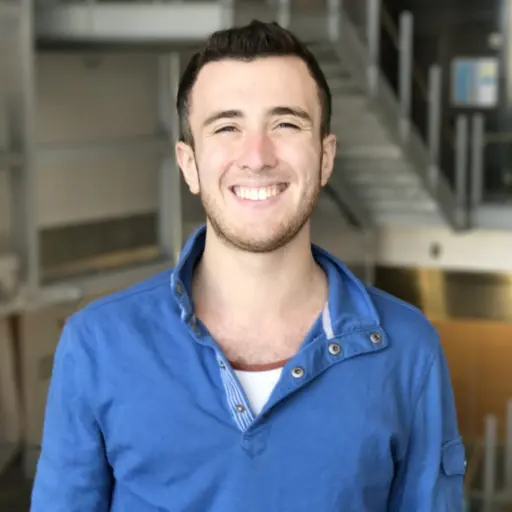Max Goldberg sets his sights higher than the stratosphere.
Goldberg, who will graduate with a bachelor of science degree in materials science and engineering in 2019, isn’t just shooting for the moon metaphorically—he’s actively pursuing his ambitions to help humanity reap the benefits of outer space travel. Thanks to two overlapping opportunities—an internship with visionary entrepreneur Peter Diamandis and a position as the Matthew Isakowitz fellow for commercial spaceflight—during summer 2018, Goldberg has the chance to work at the forefront of exploring humankind’s final frontier.
 Max Goldberg
Max Goldberg
“I’m really passionate about materials and resource use in space,” says Goldberg, whose fascination with space dates to his childhood.
His interests intensified in 2004, when he learned about the Ansari X Prize competition to develop a reusable rocket ship.
“I realized there’s a whole economy that’s about to open up in space and there’s an opportunity to make a really big impact on a lot of people,” says Goldberg.
After watching video of the experimental spaceplane SpaceShipOne—the 2004 X Prize winner— successfully complete its first manned private spaceflight in 2004, Goldberg closely followed the entrepreneurial endeavors of X Prize founder Diamandis. When Goldberg learned of a summer internship opportunity with one of Diamandis’ many ventures, a group called Strike Force, he leaped at the chance to work alongside and learn from the serial entrepreneur.
“I’m passionate about making the most of resources,” says Goldberg. “Not only in space, but also in terms of opportunities on Earth.”
In keeping up to date with opportunities for new engineering graduates, Goldberg also learned of the Matthew Isakowitz Fellowship, which recruited applicants for its inaugural class in 2018.
Founded to memorialize Matthew Isakowitz—an aerospace engineer and entrepreneur who passed away in 2017 at age 29—the fellowship places exceptional students in paid internships at cutting-edge commercial spaceflight companies around the United States. The program culminates with a summit in Los Angeles, where fellows network with industry leaders, visit space start-ups and hone their entrepreneurial skills.
Goldberg was selected for the both the Matthew Isakowitz fellowship and an internship with Strike Force.
Fortunately, the Matthew Isakowitz Fellowship organizers placed Goldberg with Strike Force—his overlapping opportunities aligned perfectly.
“I’m really grateful. I get the benefits of both programs. This is a once-in-a-career opportunity,” says Goldberg.
Goldberg comes from a long line of enterprising small business owners: His great-grandfather built a successful industrial vacuum company from the ground up in the years following the Great Depression. That entrepreneurial spark burned even brighter during Goldberg’s time at UW-Madison thanks to his participation in student organizations like Badgerloop and Transcend.
“I’m thankful to the university for the opportunity to learn a lot and work on a project in an entrepreneurial environment,” says Goldberg. “Even though Badgerloop was a student organization, we really functioned like a start-up, raising our own funds and building things at the same time.”
On-campus mentors at UW-Madison also helped Goldberg realize his ambitions. In particular, Kyle Hanson, lab manager for the Wisconsin Electric Machines and Power Consortium, and Materials Science and Engineering Professor Mike Arnold both advocated for Goldberg during the fellowship application process. Goldberg performed undergraduate research under Arnold’s guidance, investigating carbon nanotube processing.
In the future, Goldberg hopes to continue merging engineering and entrepreneurship for space exploration. He’s founded a company in Madison called Next Frontier, which held a well-attended MasterMind networking event in April 2018. Next Frontier is aimed at building relationships among innovators who are passionate about making the most of resources and opportunities, both beyond the confines of earth and closer to home.
“The technology we build for space can have a huge impact on earth,” says Goldberg.
Devices that function in extreme environments or make maximum use of limited resources are important for space travel, but they can also help address terrestrial problems. One example could be extracting carbon from the atmosphere to create electrical components—an attractive proposition on Mars or in Madison.
Even as Goldberg reaches for the stars, however, his notion of business is fully grounded in reality.
“It’s expensive to build technology for space, and it’s risky,” says Goldberg. “But if you can start developing for applications on earth, while keeping in mind that space is the goal, then you can start legitimate companies that have real market caps on earth, and later build out for space.”